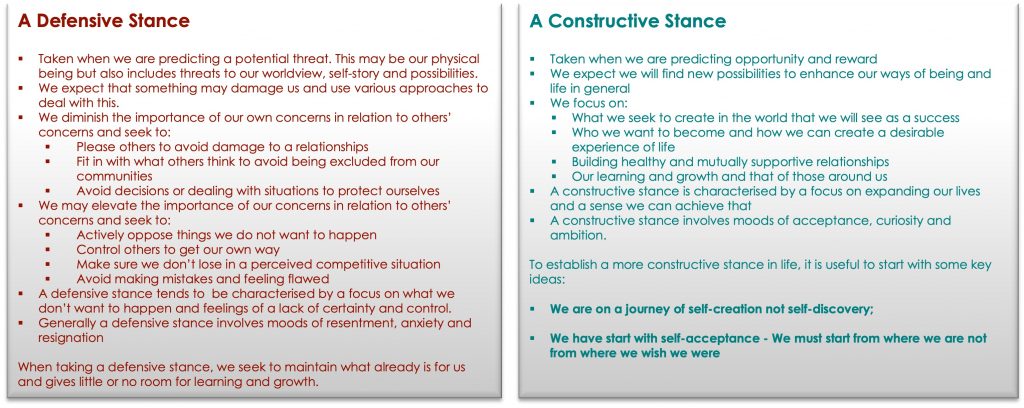
Chilean biologists Humberto Maturana and Francesco Varela identified that living organisms, including we humans, have both conservative and expansive tendencies.
Our conservative tendency is to continue what is already so for us. We put a great deal of energy into doing this. We feed ourselves and exercise, clean our house, take care of our garden, and work to earn an income, all in the name of maintaining what we have. Not only do we seek to retain what we have in terms of assets and life in general, we also seek to maintain our sense of self and the relationships that matter to us. In other words, we seek to conserve our life across all three domains of the Integral Model – I, We and It.
This tendency lends itself to a defensive stance in life as we seek to protect what we have. We are on guard for threats, using various strategies to defend ourselves. How we do so when it comes to aspects of the world such as our physical safety, money or home is fairly apparent. However, the means by which we defend ourselves from threat in terms of our ways of being and relationships can be less obvious.
When taking a defensive stance, we do so in various passive and aggressive ways.
In taking a passively defensive stance, we diminish the importance of our own concerns in relation to others’ concerns and may seek to:
- Please others to avoid damage to our relationships and feel we are liked and worthwhile
- Fit in with what others think and do to avoid being excluded from our family, friends and communities
- Avoid making decisions so as to not get blamed
- Distance ourselves for perceived threatening situations to protect ourselves
In taking an aggressively defensive stance, we tend to elevate the importance of our concerns in relation to others’ concerns and may seek to:
- Actively oppose things we do not want to happen even if we have little chance of changing the course of events
- Control others to get our own way (Paradigm of Control) with little or no concern for others who might be involved
- Make sure we don’t lose in a perceived competition
- Avoid making mistakes and an associated feeling of inadequacy
A defensive stance tends to be characterised by a focus on what we don’t want to happen and unpleasant feelings of related to uncertainty and feeling out of control. It generally involves more unpleasant moods such as resentment, anxiety and resignation. When taking a defensive stance, we seek to maintain what already is so for us, giving little or no room for learning and growth.
On the other hand, we sometimes dream about what more could be. We seek to expand our life and go beyond what we currently have. We are expansive.
When being expansive, we take a constructive stance. We tend to focus on who we want to become, what we seek to create in the world and building healthier and more supportive relationships. We tend to be curious and look for opportunity rather than seeing threat everywhere. A constructive stance tends to generates moods of acceptance, curiosity and ambition.
A constructive stance begins with acceptance of our current situation and ways of being. It can be summed up the phrase, “you have to start from where you are not from where you wish you were”.
When dealing with breakdowns, we always find ourselves in a space where we will seek to retain what we have (conservative tendency) or seek and develop new opportunities (expansive tendency). Sometimes we will do both. As we are basically habitual in nature, it is more likely we will be conservative unless the situation is very new for us and we have to do something for the first time or we have some intentionality about a desired future.
The degree to which we seek to conserve or expand is unique to each of us. The stories we have about ourselves and the world will create a context for our interpretations of what we wish to conserve or develop as new possibilities in our life.
One premise of this work is we are capable of greater intentionality in generating who we aspire to become and the life we wish to live. This applies to what we seek to retain and what we wish to construct. The idea of living constructively does not mean never being defensive. There are aspects of our life that may come under threat and which we may need to protect. However a constructive approach involves a recognition that there are threats we simply have to defend against. However, once we deal with the immediate threat, we seek to create a new way of dealing with future such breakdowns. We recognise what we don’t want and seek to create what we do. This simple idea is at the heart of most coaching. Clients come to a coach knowing something is not working for them. They make be able to articulate what this is or it may simply be about how they feel. A coach’s role is to create clarity around a breakdown then help their client identify what they want to have in the future and create that future whether it be in terms of their on ways of being, their relationships or the outcomes of their actions. This shift from what one doesn’t want to what one does want is the ‘coaching turn’.
